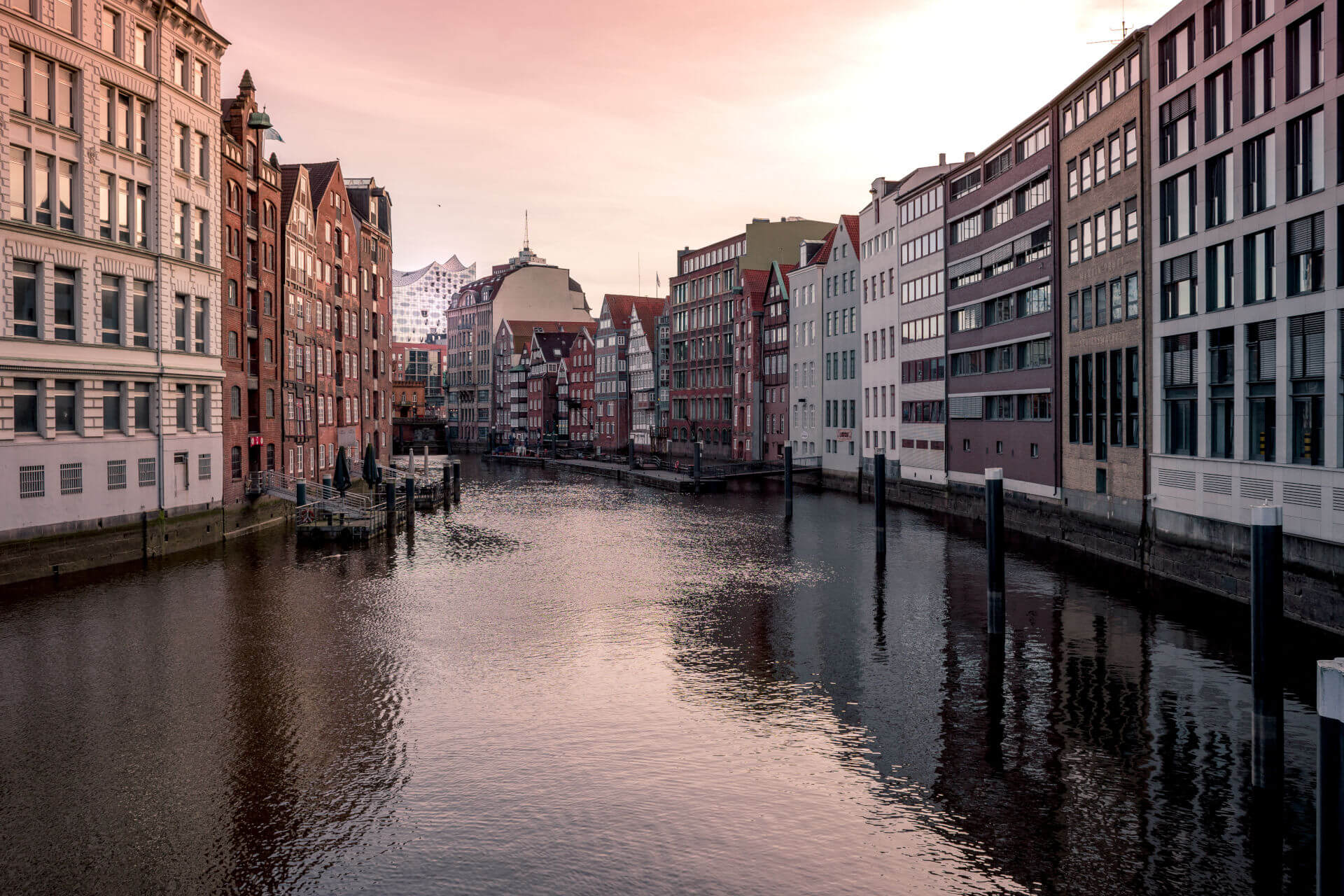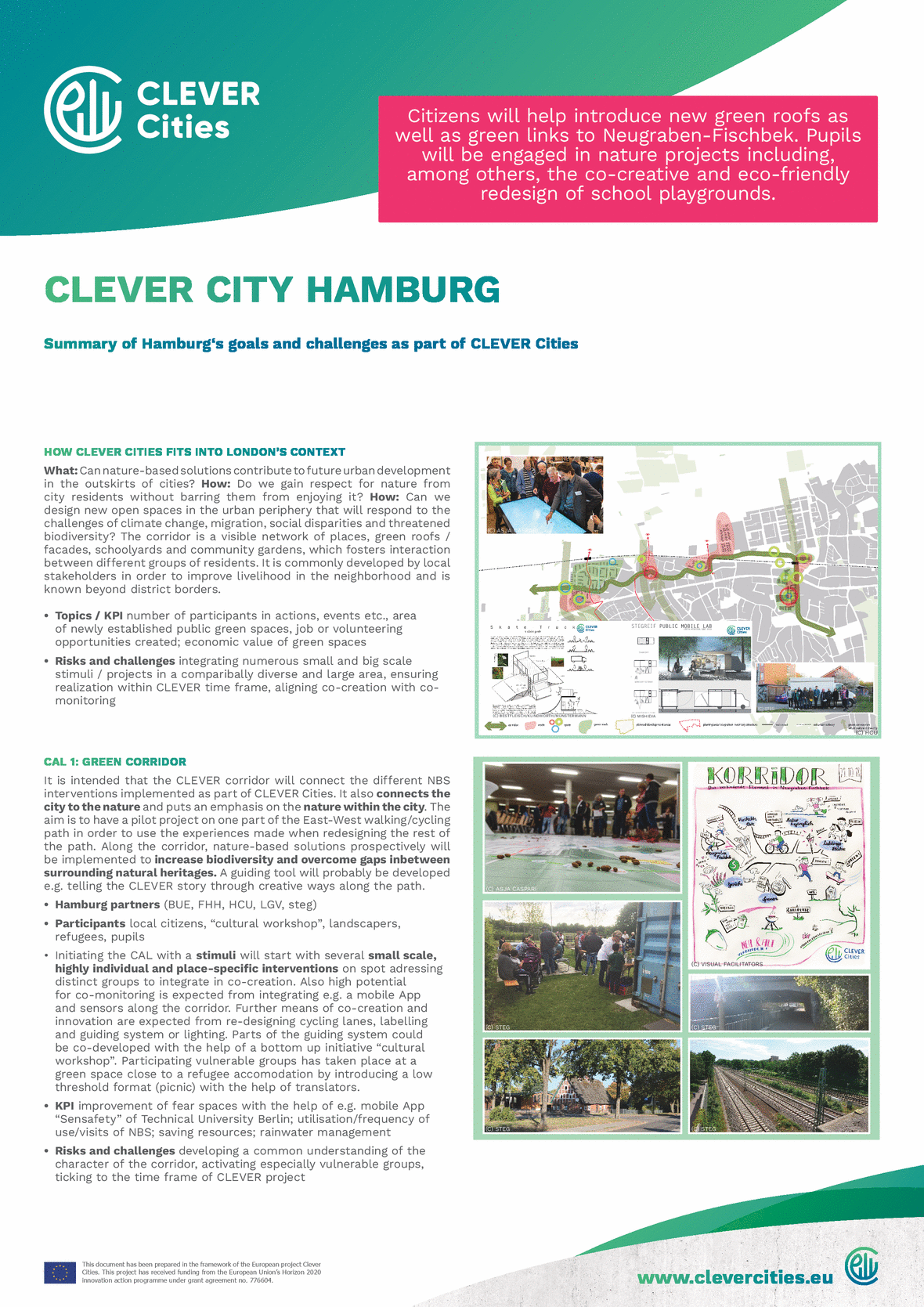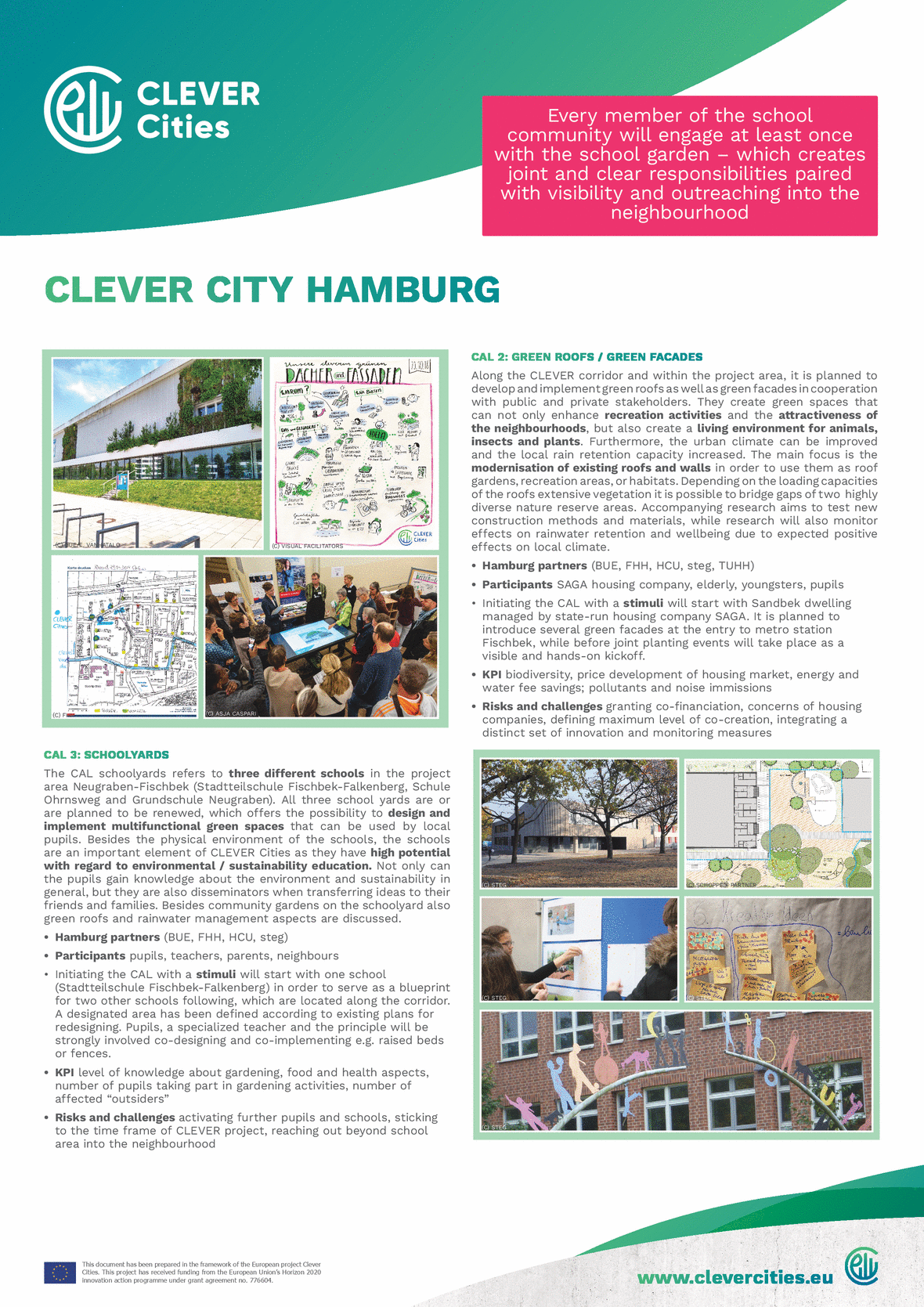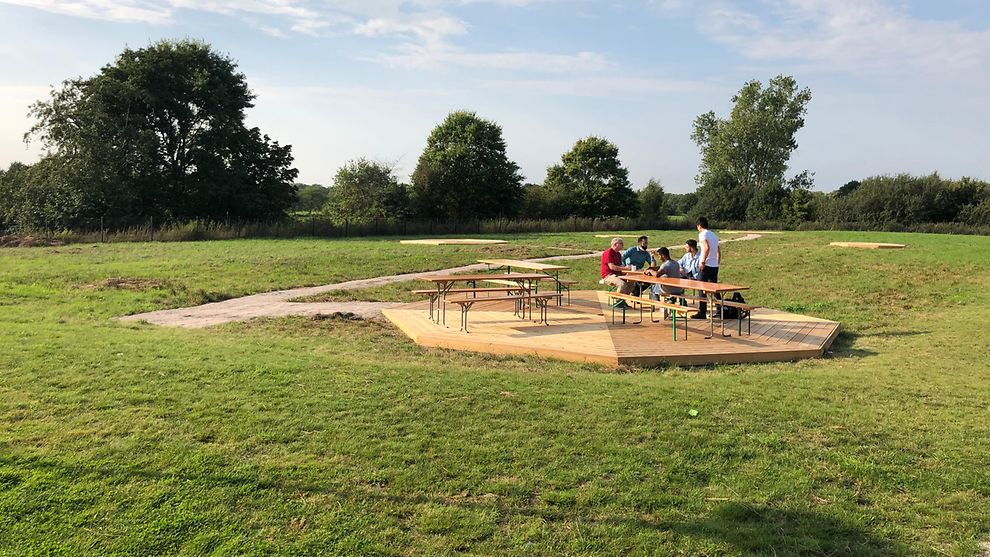Hamburg, Germany
Population: 1.7 Million
Hamburg is Germany’s second largest city and largest port, with direct access to the North Sea via the Elbe River. Hamburg not only has a rich maritime and trading history, but is also an educational and cultural hub, with several research institutions and the recently inaugurated Elbphilharmonie concert hall and its world-class acoustics.
Hamburg’s CLEVER Action Lab: Neugraben-Fischbek
Located in the South-West of Hamburg, Neugraben-Fischbek has a rich history: both Neugraben and Fischbek used to be independent villages and became part of Hamburg during the 1930s. Nowadays the area is growing even faster than the rest of city and new housing areas are under construction.
The CLEVER Action Lab reaches from central Neugraben, via the Fischbek public school and the Sandbek housing estate, towards new housing development areas in the West. Architecture in the area ranges from old village-style houses to the 1960s high-rises of Sandbek.
Aims
A green corridor
The green corridor aims to increase biodiversity and increase or upgrade nature in the city. It is not a continuous green zone, but follows a ‘stepping stone’ approach of smaller projects such as the introduction of new nesting aids for bees or the planting of new climate resilient trees. The green corridor has been consolidated with the so-called ‘CLEVER Parcours’ which unifies all projects in one urban walking (jogging, cycling, exercising, etc.) route.
Green roofs
Two ground-based and low-cost green facades were built along the ‘Veloroute 10’ noise barrier at the train station of Neugraben and in the Sandbek housing estate. While the former uses a self-climbing plant with short root growth, the latter boasts a people-polled trellis in the shape of a butterfly.
School playgrounds/interactive NbS
CLEVER teamed up with a local school to build a stationary school garden in the schoolyard and two mobile aquaponics systems for the classrooms. These can be easily moved from one classroom to another and allow for new kind of gardening based scientific education in schools.
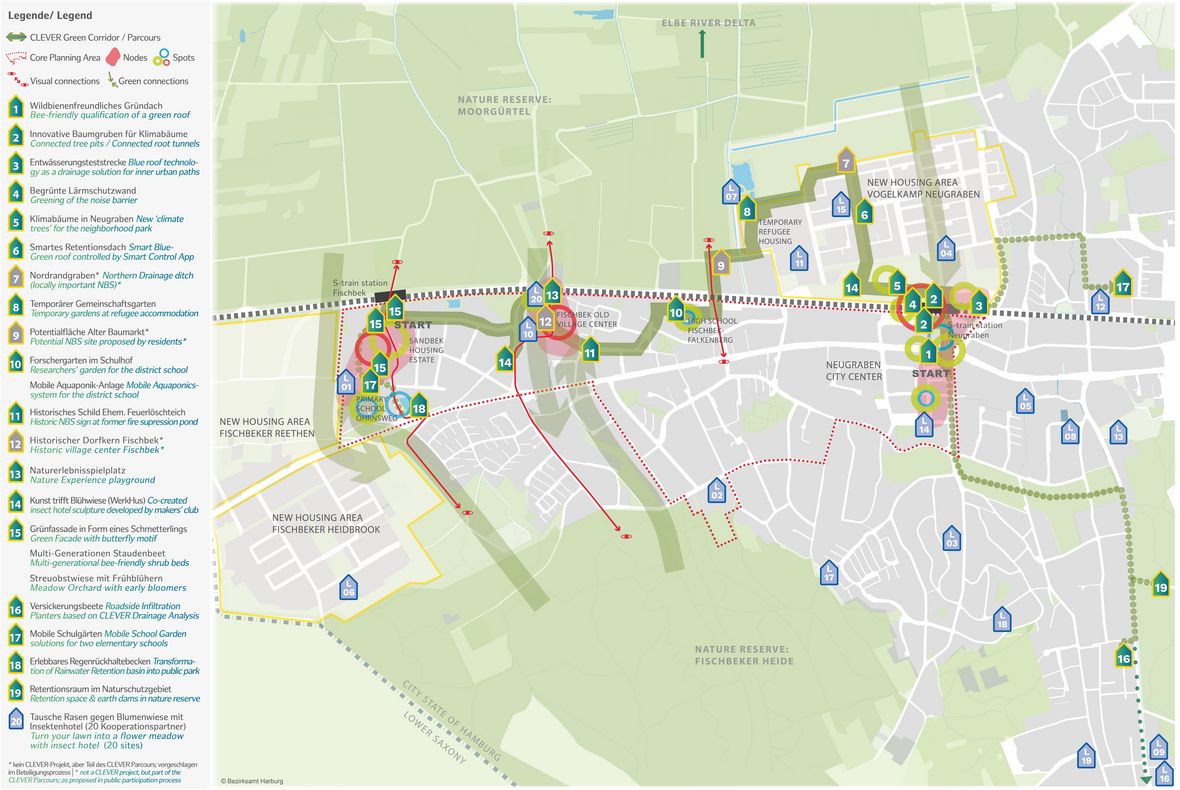
Latest news from Hamburg
CLEVER Hamburg joins proGIreg in Dortmund
4 October 2022
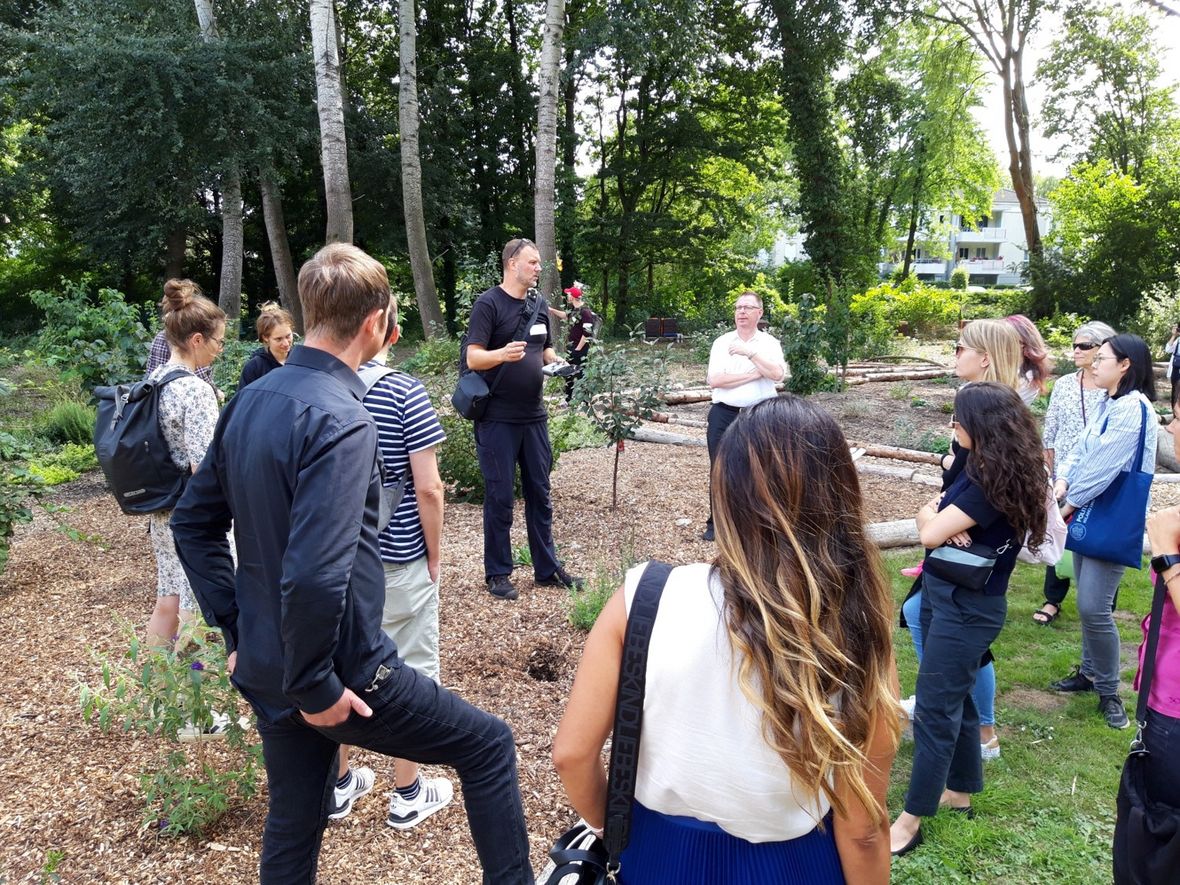
This August, CLEVER Cities Hamburg had the pleasure of taking part in a 2-day workshop on strategies for replicating successful nature-based solutions (NBS) hosted by our sister project, proGIreg. Participants were invited to visit multiple NBS project cites in proIireg city Dortmund. Standouts included a Movement Park (outdoor gym), a Forest Garden at a local church, two aquaponics greenhouses located at a former coal plant, and a new footpath through former landfill Deusenberg Park.
Hamburg High School Students Fish for Learning
9 August 2022
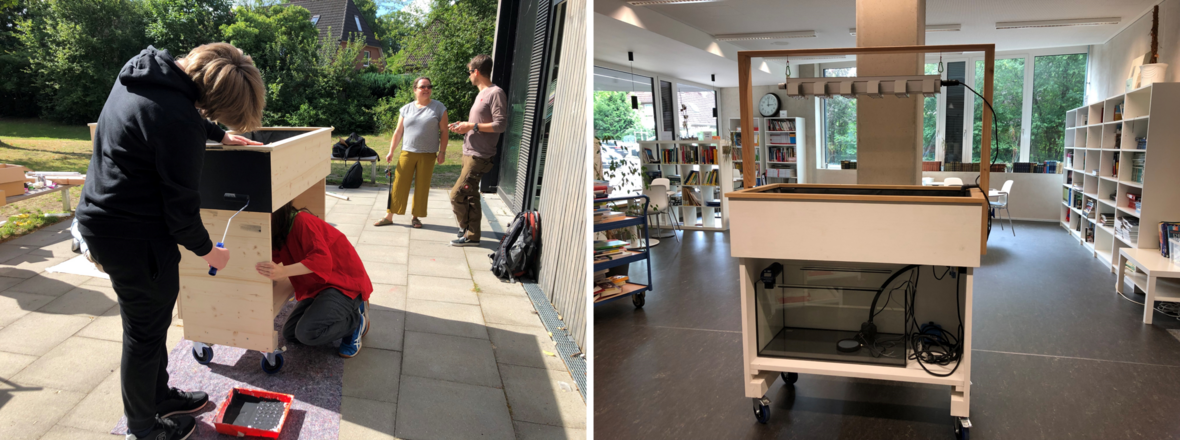
Nature-based solutions (NBS) are not only good for the environment and human health, but can form the foundation of creative and lucrative business models. CLEVER Cities Hamburg is bringing this knowledge to schools by linking NBS to academic science content, the agricultural industry, and water purification. How? Aquaponics!
Sandbek Housing Estate Residents Join CLEVER Cities in Building Green Façade
13 July 2022
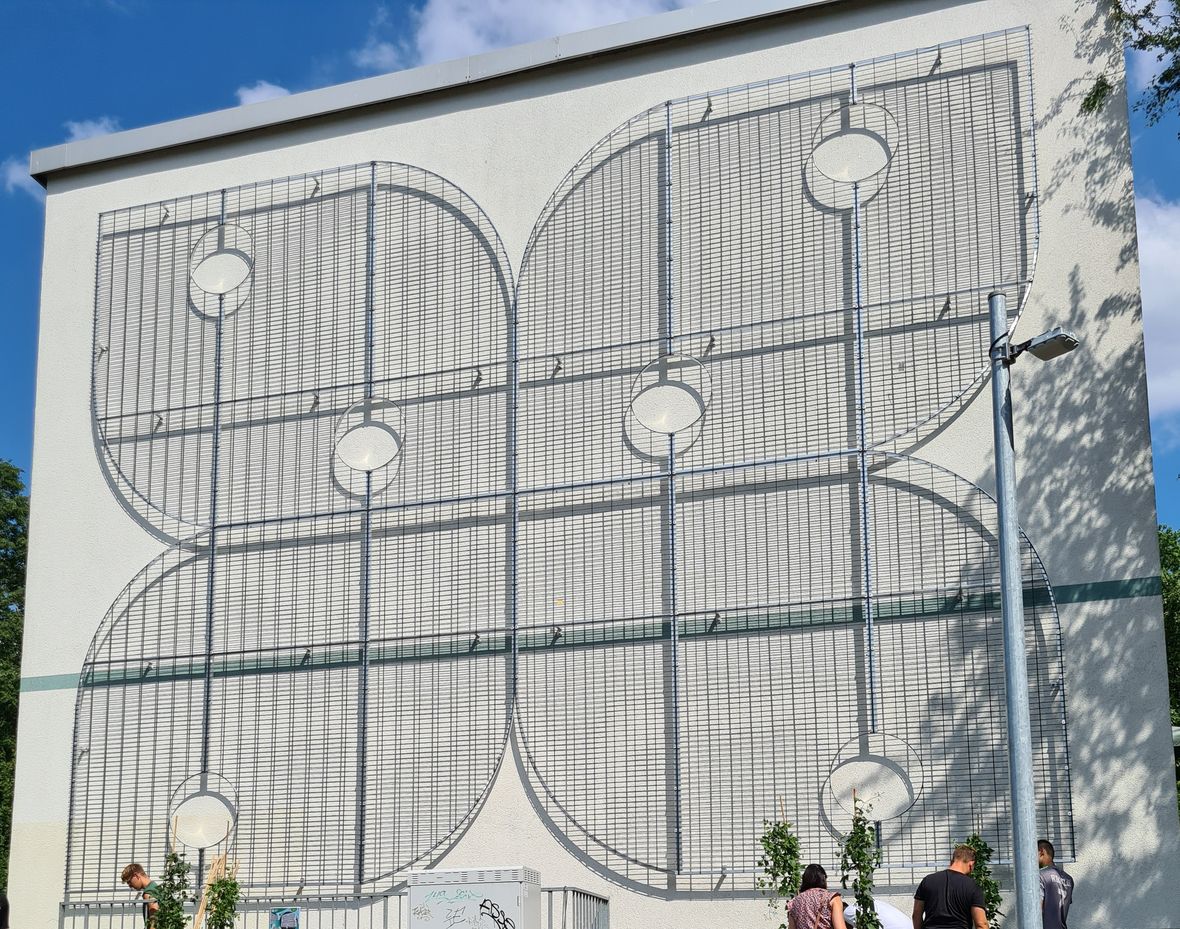
After four years of planning, Sandbek housing estate residents of all ages joined CLEVER cities in the planting of a butterfly shaped green façade. Under the guidance of two experienced gardeners, residents co-creatively planted 12 climber plants (Clematis and Knotweed) along the façade.
Participants included two siblings from the flat directly opposite the façade who were eager to each plant one of the big 1.5 m high clematis plants and committed to taking care of watering for the foreseeable future. This willingness to look after the plants is a clear indicator of the successful co-management vision of CLEVER.
Roadside Infiltration Beds: Integrating Nature into Roadsides through Small Interventions
22 June 2022
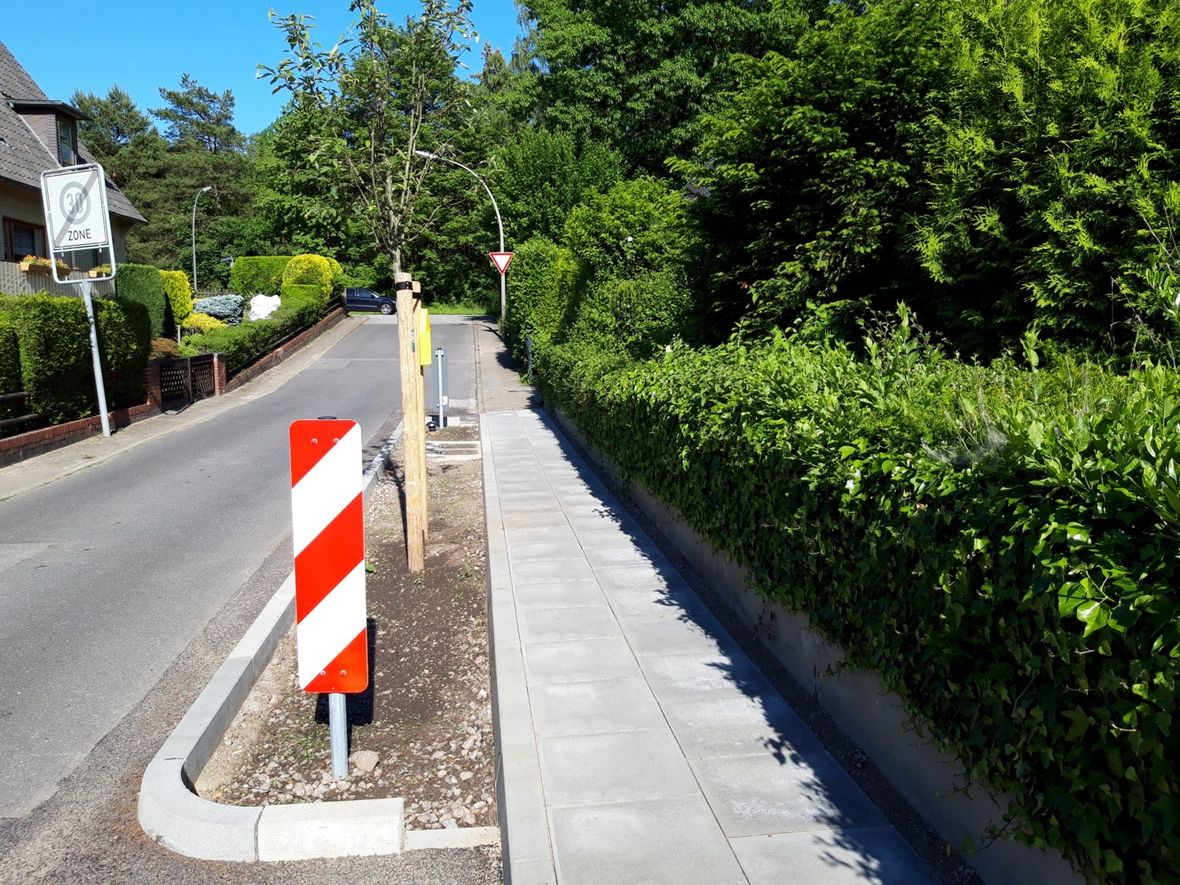
CLEVER Cities Hamburg has recently completed 6 innovative roadside infiltration beds in the neighborhood of Neugraben-Fischbek. Roadside infiltration beds are made up of a topsoil mixture that filters and cleans road water (run-off) before it enters the groundwater system.
Hamburg’s new beds will test whether infiltration planters can be used as a nature-based solution (NBS) climate adaptation measure in areas affected by heavy flooding during stormwater events. In addition to the beds, a variety of street trees have been planted. These trees are part of a study exploring what kind of roadside vegetation is able to grow in conditions that range from dry to very wet.
Community Designed Mobile School Gardens
22 June 2022
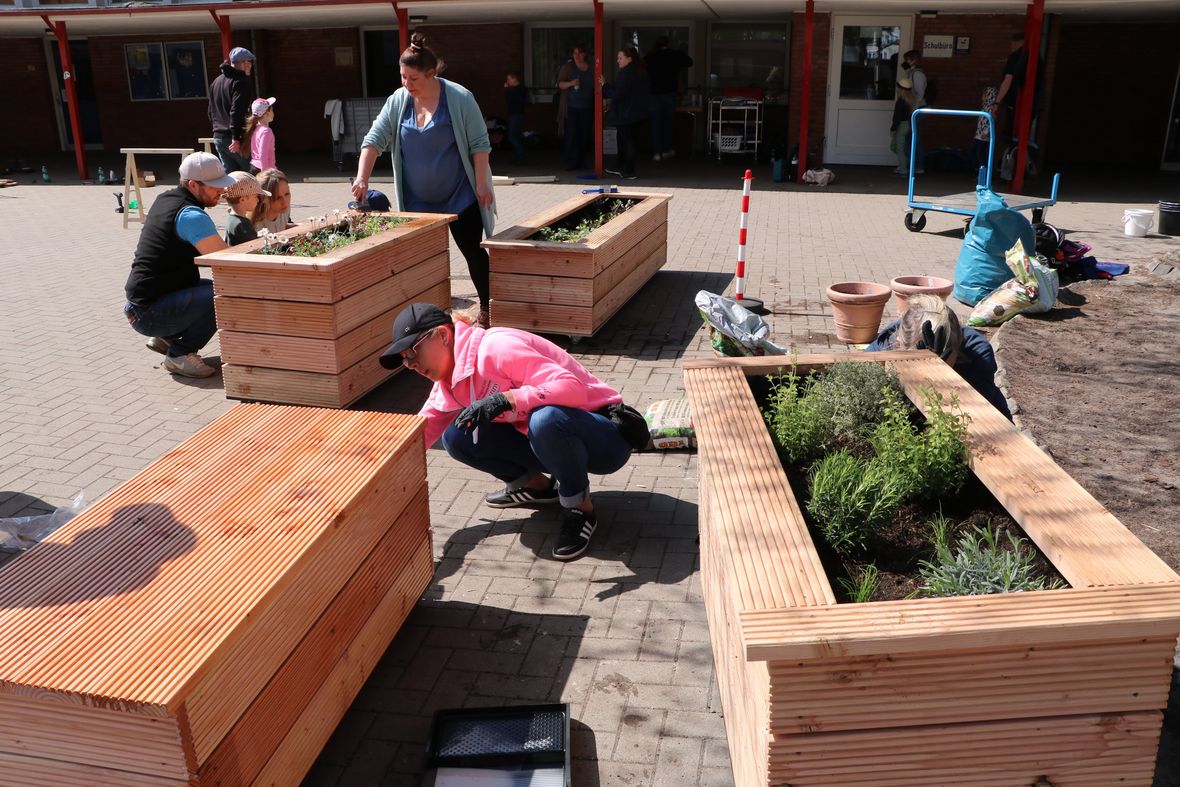
CLEVER Cities Hamburg partnered with students, family members, and teachers to recently built two mobile school gardens in two primary schools in Neugraben-Fischbek. Originally, the schools planned to turn an existing area of the school yard into a school garden and outdoor classroom. However, the neighborhood is currently undergoing demographic changes that are increasing demand for primary schools.
As a result, the local school authority has instead proposed enlarging both schools and restructuring their school yards. Though these changes will occur over the course of a few years, they nonetheless limit the lifespan of the sustainable and long-term NBS schoolyards planned by CLEVER.
CLEVER Cities Hamburg: Nature adventure playground in Neugraben-Fischbek inaugurated
6 May 2022
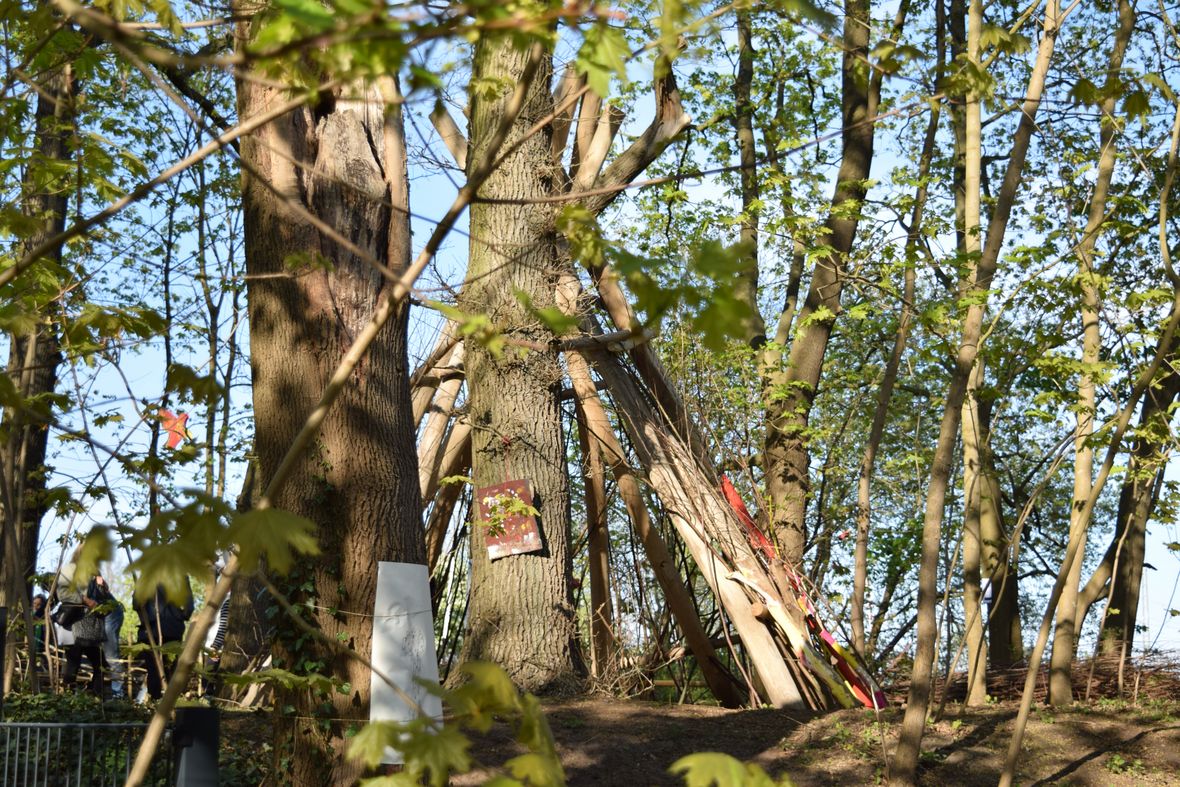
A new nature adventure playground enjoyed its grand opened in the Hamburg CLEVER project area of Neugraben-Fischbek (NF) on April 25th, 2020. The party featured a collection of land art objects designed by pupils of a near-by elementary school, exhibited in the branches of the playground’s beech trees.
The playground is one of many CLEVER interventions designed to strengthen green link networks of in Neugraben-Fischbek. Coordinated by the CLEVER Cities project, these interventions jointly form the so-called “CLEVER parcours,” a route connecting Nature-based solutions (NBS) that have been or will be implemented. Bernd Lange, a member of the European Parliament has also put together a Komoot tour of the routes, which visitors can follow by bike.
Neighbourhood festival celebrates opening of Hamburg's CLEVER Parcours
9 November 2021

On 22 October, CLEVER City Hamburg held a neighbourhood festival at the Vogelkamp park to celebrate the opening of the CLEVER Parcours - a wayfinding system that connects numerous nature-based interventions in Hamburg’s Neugraben-Fischbek district.
Designed to indicate the way between different Nature-based interventions, the CLEVER Cities Parcours consists of miniature yellow houses holding different contents depending on their location and the interventions they correspond to.
Hamburg signs Edinburgh Declaration in support of greater action to safeguard biodiversity
4 October 2021

In recent weeks, the Senate of Hamburg, one of CLEVER Cities’ Front-Runners, signed the “Edinburgh Declaration on the post-2020 Global Biodiversity Framework”, a statement of intent that paves the way for a strengthened role for subnational governments in global biodiversity action.
The declaration is the culmination of an extensive and comprehensive consultation of stakeholders, including CLEVER Cities, led by the Scottish government.
Linking the city to nature: Hamburg kicks-off co-design process of wayfinding system
14 April 2021
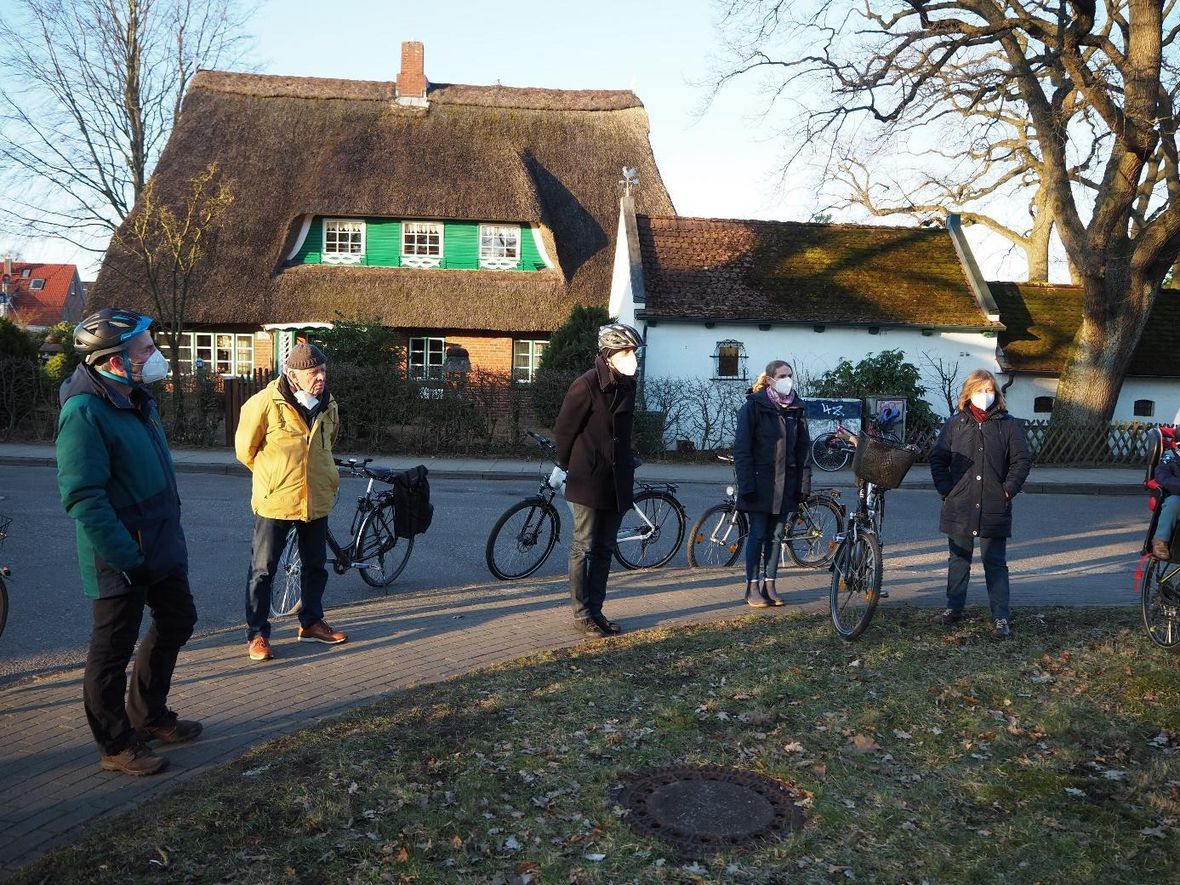
To link the city to nature and emphasize nature within the city, the CLEVER Cities team in Hamburg is designing a new wayfinding system in the district of Neugraben-Fischbek that will provide information on place-specific nature-based interventions in the area, establish connections between them, offering orientation, while at the same time embedding them into existing paths.
In March 2021, the district office of Harburg kicked off a co-creation process to get residents and local stakeholders involved in designing the new system, which will link different elements of the new CLEVER corridor.
New orchard in Hamburg gives shelter to rare and regional apple tree varieties
26 January 2021

Orchards play an important role in supporting biological diversity. Providing habitat to over 5.000 animal and plant species, traditional orchards belong to the most biodiverse ecosystems in Europe because they combine two different habitats in one single area: a sparse population of fruit trees above and meadows and grasslands below.
In the city of Hamburg, CLEVER Cities partners Steg Hamburg and the borough of Harburg, in collaboration with the Rüm Hart Foundation and the urban housing and development company SAGA, planted a new orchard in the Neugraben-Fischbek district.
Next to the refugee accommodation “Am Röhricht”, maintained by the German Red Cross in Hamburg’s Neugraben-Fischbek district, there is an open space with boggy and uneven ground. A redesign is planned for 2027, when the accommodation will no longer exist in the same area.
In the meantime, CLEVER Cities partners and the head of the facility decided that the surrounding green spaces could not be left unused - together with locals, they are making the area suitable for leisure and entertainment activities to foster nature connectedness.
Green roofs for CLEVER Cities: Remote sensing of green roof potential in Hamburg
2 September 2020

The journey to becoming a greener city has many steps, one of them being the implementation of effective instruments for environmental monitoring. In Hamburg, CLEVER Cities is conducting an assessment of how urban nature is changing in the Neugraben-Fischbek district, and evaluating different tools and methods to support local monitoring activities.
New green roofs will be constructed in the area to test their potential to retain rainwater and to provide more recreational green spaces to residents, leading to reduced temperatures in summer and improved well-being.
Lessons from Germany and China on building liveable cities post-COVID pandemic
10 August 2020

How to build more liveable urban spaces in the aftermath of the COVID-19 pandemic? Different approaches exist, but cities around the world should aim to create green spaces that foster resilience and social equality, concluded a group of Chinese and European municipalities who attended the seminar "Building Liveable Cities in Post COVID-19 Time". Co-hosted by the China Center for Urban Development, UN-Habitat, ICLEI and the Chengdu Municipal People’s Government, the event took place virtually on 8 July.
During the pandemic, it became clear that many cities are yet to meet important liveability criteria, said the representative of the World Health Organization (WHO) in China Gauden Galea.
CLEVER Cities Hamburg team takes part in district festival ‘Neugraben Erleben’
8 October 2019
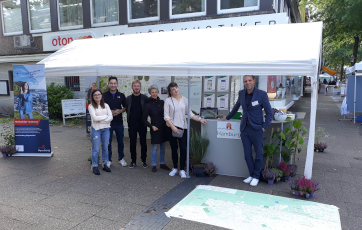
On 8th September 2019, the Neugraben Center in Hamburg hosted the district festival ‘Neugraben Erleben’ with approx. 5000 visitors. The festival, whose title means 'Experience Neugraben', is held every year and brings out the district’s wide range of clubs, institutions and associations. Around 40 local groups typically contribute to the event, representing themselves and their activities in the area, giving an insight into the cultural and eventful diversity of the district.
The Hamburg Partner Team presented their work as part of CLEVER Cities at a public stand throughout the day.
The invisible industry of urban nature
25 March 2019
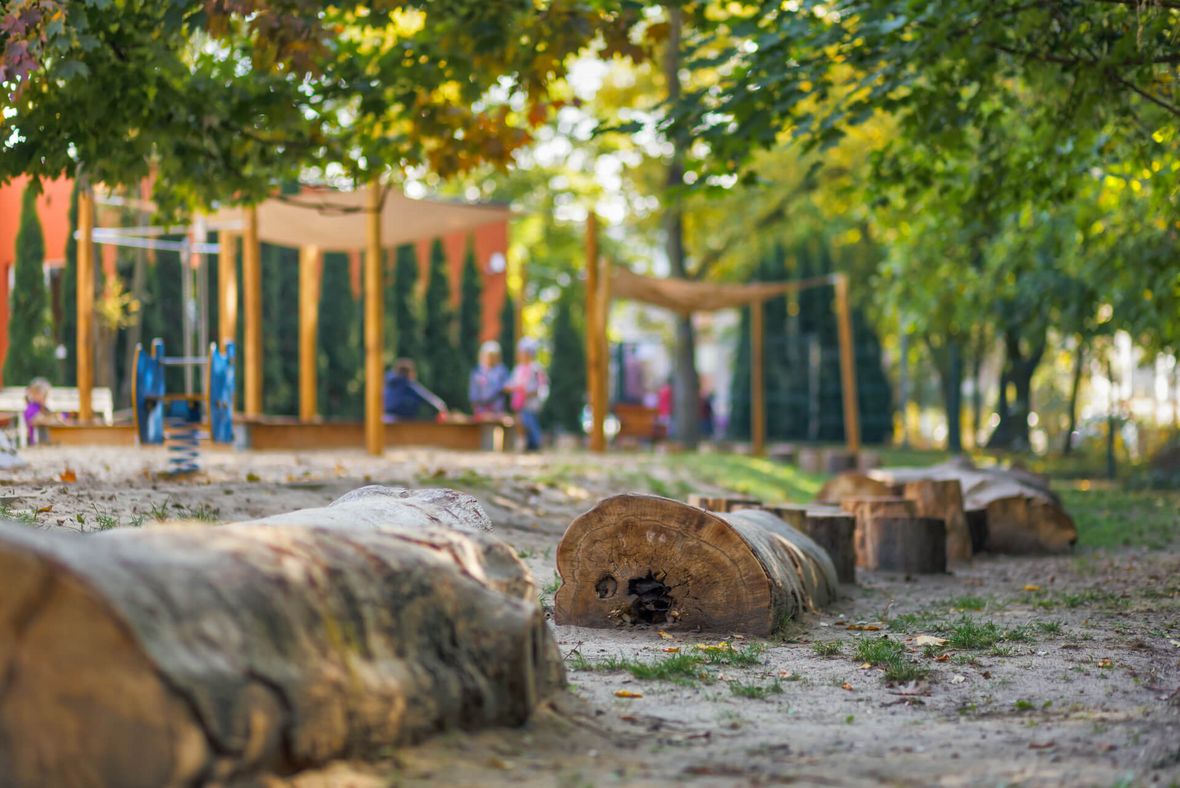
1.4m schoolchildren demonstrated across the world on Friday 15th March to call for systemic change to safeguard their future. The schoolchildren name extreme weather events, access to drinking water, health, air temperature, peaceful communities, biodiversity, clean air and jobs for the future among their worries. While no single measure can protect us from all of the threats triggered by climate change, one type of transformation does manage to tick a startling number of boxes: urban nature.
Top marks for green cities
22 February 2019

How the CLEVER Cities team can tell whether our nature-based interventions are working
It is common knowledge that living near nature makes you healthier and happier. But is it possible to actually measure this? How can decision-makers make the case for investing in nature-based interventions?
The CLEVER Cities project team is working on coming up with a way to do exactly that through a combination of hard science, citizen science and flexibility. The CLEVER Monitor is designed to be robust enough to provide concrete data on the performance of the nature-based solutions, and is also adaptable enough to account for our learning over time and the differences between cities.
Co-creation - the CLEVER Cities way
14 February 2019
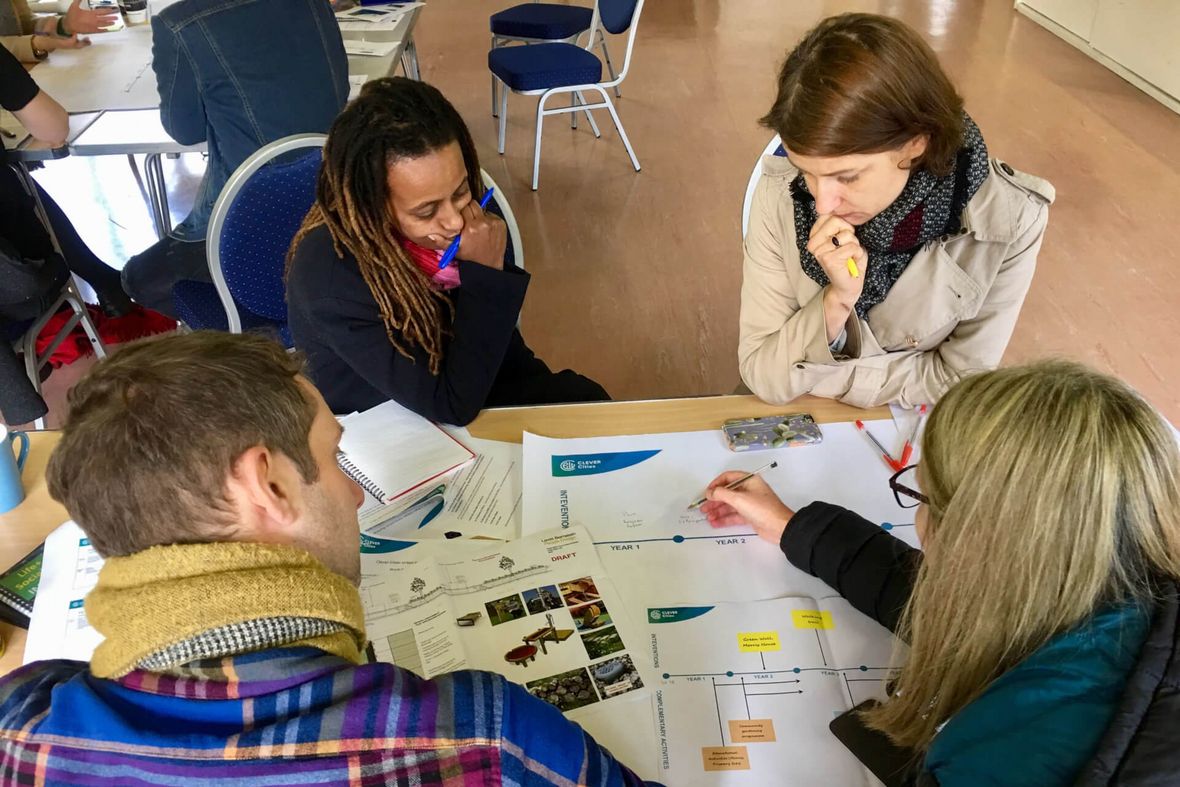
Between October and December 2018 the three front-runner cities of Hamburg, London and Milan took the first steps towards co-creating their CLEVER Cities Action Labs - the specific areas of these cities targeted for green regeneration within the CLEVER Cities project.
Inclusive urban development
But what does co-creation really mean? For the CLEVER Cities project it’s about opening local urban development to non-governmental organisations, foundations, civil society, research institutions and local citizens and businesses, ensuring all jointly design, implement, monitor and ultimately own the project.
CLEVER Action Lab in Neugraben-Fischbek, Hamburg, kicks off
19 November 2018
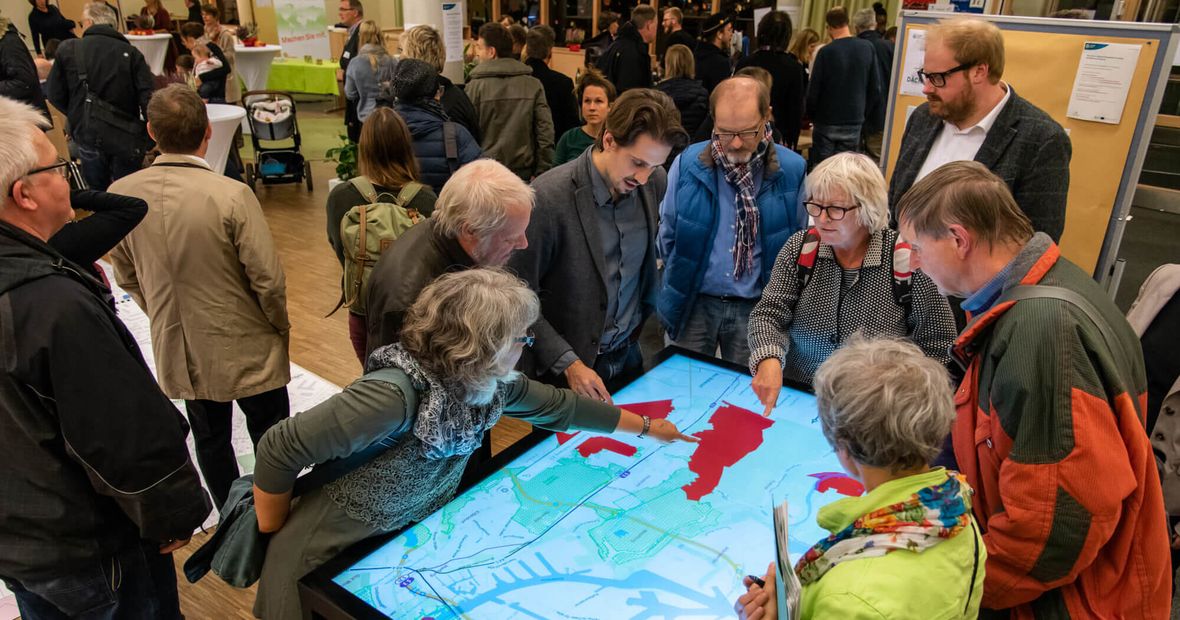
On 29 October 2018 the citizens of Hamburg's CLEVER Action Lab, Neugraben-Fischbek, came together in the local community centre to start designing the green regeneration of their area.
This event, which was hosted by the city of Hamburg and its local partners, kicked off the five-year CLEVER Cities project for Hamburg, where the plan is to use nature-based solutions to improve living standards and make the area more climate-proof. Many citizens attended the event and gathered around the four thematic tables.




